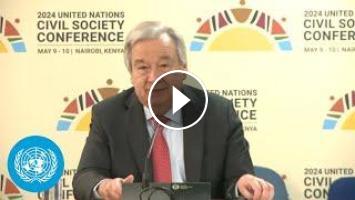Secretary-General António Guterres said that the situation in Rafah is “on a knife’s edge,” and appealed again for Israeli and Hamas leaders “to demonstrate political courage and spare no effort” in reaching an agreement to end the war in Gaza and free all hostages.
Guterres today (10 May) spoke at a press conference in Nairobi ahead of the closing of the UN Civil Society Conference held there this week.
The UN chief said, “Over one million Palestinians, half of whom are children, have crowded in the Rafah Governate for shelter. We are actively engaging with all involved for the resumption of the entry of life-saving supplies – including desperately needed fuel – through the Rafah and Kerem Shalom crossings.”
Meanwhile, Guterres added, “our health partners tell us that all the key medical facilities in Rafah could soon become inaccessible or inoperable – including the only dialysis department still operating in Gaza.”
He continued, “Around 100,000 Palestinians are moving north from Rafah, yet humanitarian partners have no tents or food stores left in south Gaza. A massive ground attack in Rafah would lead to an epic humanitarian disaster and pull the plug on our efforts to support people as famine looms.”
“International humanitarian law is unequivocal: civilians must be protected,” the Secretary-General reiterated.
Guterres also expressed solidarity with the Kenyan people, and extended deepest condolences to those who have been affected by the devastating floods in the country and elsewhere in East Africa.
He said the UN will continue to support relief efforts by the Government.
Guterres also highlighted that Africa is being blasted by extreme weather, turbocharged by a climate crisis it has done next to nothing to create: From lethal floods in the East, to deadly droughts in the South.
He said, “Africa could be a renewables giant. It is home to thirty percent of the minerals critical to renewables, and sixty percent of the world’s best solar resources. Yet, in this unfair world, in recent decades, it received just two percent of the investments in renewables. And too often, countries and communities with critical energy transition minerals are exploited and relegated to the bottom of the value chain. Others take the profits somewhere else.”
The UN chief reiterated that the world body is fighting for climate justice, adding that the new Panel on Critical Energy Transition Minerals – co-chaired by Ambassador Nozipho Joyce Mxakato-Diseko of South Africa – will develop voluntary principles to ensure developing countries receive maximum benefit.
Guterres said, “We are calling for developed countries to honour their promises on climate finance – including funding to help countries prepare for the worst of climate chaos; For significant contributions to the new Loss and Damage Fund; For action to reform the multilateral development banks so that finance flows to climate action; And for the G20 to lead efforts to slash emissions and accelerate a just global phase-out of fossil fuels.”
He asked African leaders to support these efforts, and urged all governments to “create ambitious new national climate plans by next year. Plans that drive sustainable development, attract investment, and align with limiting global temperature rise to 1.5 degrees Celsius to avoid the worst of climate chaos.”
“Africa’s fate rests on meeting that limit,” he reiterated.
The Secretary-General also expressed concerned about the ongoing war in Sudan
“Close to nine million people have fled their homes. And the World Food Programme warns that the window of time to prevent starvation in Darfur is closing rapidly,” he said.
Guterres continued, “Violent clashes in El Fasher are preventing aid getting through. An attack on the city would have devastating consequences for civilians. And would likely see the conflict tear across Darfur. I am also very concerned by reports of escalating violence in North and South Kordofan and Al Jazirah States.”
The UN chief called on all parties to “abide by international humanitarian law, protect civilians, and facilitate full and unrestricted humanitarian access.”
He concluded, “Ultimately, we know that there is no military solution to this conflict. We need an urgent, coordinated international effort to deliver a political process that can get Sudan back on track.”
Guterres today (10 May) spoke at a press conference in Nairobi ahead of the closing of the UN Civil Society Conference held there this week.
The UN chief said, “Over one million Palestinians, half of whom are children, have crowded in the Rafah Governate for shelter. We are actively engaging with all involved for the resumption of the entry of life-saving supplies – including desperately needed fuel – through the Rafah and Kerem Shalom crossings.”
Meanwhile, Guterres added, “our health partners tell us that all the key medical facilities in Rafah could soon become inaccessible or inoperable – including the only dialysis department still operating in Gaza.”
He continued, “Around 100,000 Palestinians are moving north from Rafah, yet humanitarian partners have no tents or food stores left in south Gaza. A massive ground attack in Rafah would lead to an epic humanitarian disaster and pull the plug on our efforts to support people as famine looms.”
“International humanitarian law is unequivocal: civilians must be protected,” the Secretary-General reiterated.
Guterres also expressed solidarity with the Kenyan people, and extended deepest condolences to those who have been affected by the devastating floods in the country and elsewhere in East Africa.
He said the UN will continue to support relief efforts by the Government.
Guterres also highlighted that Africa is being blasted by extreme weather, turbocharged by a climate crisis it has done next to nothing to create: From lethal floods in the East, to deadly droughts in the South.
He said, “Africa could be a renewables giant. It is home to thirty percent of the minerals critical to renewables, and sixty percent of the world’s best solar resources. Yet, in this unfair world, in recent decades, it received just two percent of the investments in renewables. And too often, countries and communities with critical energy transition minerals are exploited and relegated to the bottom of the value chain. Others take the profits somewhere else.”
The UN chief reiterated that the world body is fighting for climate justice, adding that the new Panel on Critical Energy Transition Minerals – co-chaired by Ambassador Nozipho Joyce Mxakato-Diseko of South Africa – will develop voluntary principles to ensure developing countries receive maximum benefit.
Guterres said, “We are calling for developed countries to honour their promises on climate finance – including funding to help countries prepare for the worst of climate chaos; For significant contributions to the new Loss and Damage Fund; For action to reform the multilateral development banks so that finance flows to climate action; And for the G20 to lead efforts to slash emissions and accelerate a just global phase-out of fossil fuels.”
He asked African leaders to support these efforts, and urged all governments to “create ambitious new national climate plans by next year. Plans that drive sustainable development, attract investment, and align with limiting global temperature rise to 1.5 degrees Celsius to avoid the worst of climate chaos.”
“Africa’s fate rests on meeting that limit,” he reiterated.
The Secretary-General also expressed concerned about the ongoing war in Sudan
“Close to nine million people have fled their homes. And the World Food Programme warns that the window of time to prevent starvation in Darfur is closing rapidly,” he said.
Guterres continued, “Violent clashes in El Fasher are preventing aid getting through. An attack on the city would have devastating consequences for civilians. And would likely see the conflict tear across Darfur. I am also very concerned by reports of escalating violence in North and South Kordofan and Al Jazirah States.”
The UN chief called on all parties to “abide by international humanitarian law, protect civilians, and facilitate full and unrestricted humanitarian access.”
He concluded, “Ultimately, we know that there is no military solution to this conflict. We need an urgent, coordinated international effort to deliver a political process that can get Sudan back on track.”
- Category
- United Nations
- Tags
- UN, United Nations, UNGA
Be the first to comment













